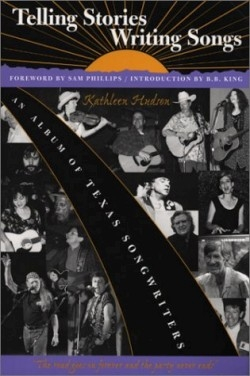Telling Stories Writing Songs
An Album of Texas Songwriters
Hudson compiled this book from transcripts of interviews she conducted during the past fifteen years with thirty-two songwriters, plus author Larry McMurtry and former football coach Darrell Royal. Some of her subjects—such as Willie Nelson, Lyle Lovett, Kinky Friedman, Tanya Tucker and Johnny Winter—are well known, but most have achieved stature only regionally or within the music business.
The author’s primary aim is to show how these songwriters’ home state’s influenced their music. She does not entertain the notion that it may not have—at least not in any large measure. Unless one is inclined to burn incense to Texas both as a concept and a landmass, the intensity of Hubbard’s boosterism quickly becomes repetitive—and puzzling. To focus so narrowly on one influence—that of place—is to overlook others of equal or greater force. Willie Nelson, surely one of the best songwriters to come out of Texas (or anywhere else), was so inspired by Tin Pan Alley songwriters that he devoted two of his most-acclaimed albums—Stardust and Without a Song—to the great pop songs of his youth. Yet this point is not alluded to in his interview.
Still, the book has a lot to offer. The fact that Hudson is such an unabashed fan keeps the songwriters from sounding as guarded and self-promoting as they might in a conventional interview. They tend to speak to her as a friend who has the same values and frame of reference that they do. In several instances, Hudson builds a songwriter’s section from snippets of interviews done years apart, an approach that reveals not only more information, but also significant changes in mood and attitude. Her 1989 and 1995 conversations with Kinky Friedman, for example, show levels of thoughtfulness and reflection almost never evident in the cut-and-paste interviews he gives to promote his mystery novels.
A real boon for music enthusiasts is Hudson’s inclusion and passionate endorsement of several relatively obscure singer/songwriters. To compensate for her interviews being light on details about her subjects’ lives, Hudson provides at the end of the book a brief biography and a selective discography for each writer. A professor of English at Schreiner College in Kerrville, Hudson is frequently too uncritical and circumspect in dealing with her subjects. She does not correct for the reader Johnny Rodriguez’s assertion that he had “[f]ourteen number one hits in a row.” (He’s had only six, and they weren’t all consecutive.) She also refers to Rodriguez’s “battle with his own personal demons” instead of stating that he was tried (and acquitted) for murder.
Reviewed by
Edward Morris
Disclosure: This article is not an endorsement, but a review. The publisher of this book provided free copies of the book to have their book reviewed by a professional reviewer. No fee was paid by the publisher for this review. Foreword Reviews only recommends books that we love. Foreword Magazine, Inc. is disclosing this in accordance with the Federal Trade Commission’s 16 CFR, Part 255.

